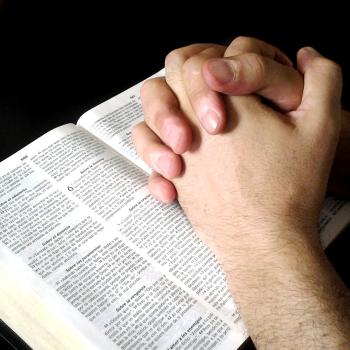No doubt all of us were caught off-guard nearly 2 years ago when COVID-19, a term we had vaguely heard about in the news, suddenly began affecting our lives in powerful and disruptive ways.

Image via Pixabay
At that time, our church shut down and went online, and we, like all leaders, were scrambling to figure out what to do next.
As my church board, staff, and myself began to grapple with the implications and our response, one of the board members sent me a message:
“Let’s not waste a crisis.”
He didn’t make up the term, of course; it’s a well-known expression. It means that every time we are thrust into challenging times, there is always opportunity for growth and good to come out of it.
This season of pandemic has forced all of us into a struggle that we didn’t expect or ask for.
To make it more complicated, we are also all being challenged in different ways.
The situation is the same, but we are not all fighting the same fight.
We have all been forced to grapple with fear: either our fear of the virus itself, or of the government, or of vaccines, or of economic effects, etc.
We have all been forced to struggle through anger: at the authorities, or at employers who have supported or not supported restrictions, or at churches that didn’t respond how we thought they should, or at people on the other side of the many debate issues that this season has brought up.
We have all been forced to carry exhaustion: weary of talking about this, living under this, not being back to “normal,” having to live in a new reality for so long.
We have all been forced to bear the burden of grief: at missed moments, separations from those we care about, cancelled events, lost jobs, divided relationships, and for some of us, the unexpected deaths of people that we love.
We have all been forced to wrestle with faith and doubt: will we trust God in the shadow of a virus? Will we trust Him in the face of our government rulers? Will we trust Him to sustain us in economic struggle? Will we trust Him to hold our churches, our friendships, our families together, even in this time of passionate disagreement? Will we trust Him that all things will ultimately work for good, even if we don’t see the fullness of that goodness until Heaven?
Instead of uniting us against a common cause, this season instead brought much division, due to people fighting different fights. Those fighting the virus came into conflict with those resisting the government; those angry at new rules brought the ire of those grieving the death of a loved one; those seeking to slow the spread were challenged by those concerned about government overreach, and on and on and on.
We don’t all feel the same way about this season, but we are all most certainly going through something. We cannot call these days anything but hardship, in a myriad of ways.
Scripture speaks to the broader issue:
7 Endure hardship as discipline; God is treating you as his children. For what children are not disciplined by their father? 8 If you are not disciplined—and everyone undergoes discipline—then you are not legitimate, not true sons and daughters at all. 9 Moreover, we have all had human fathers who disciplined us and we respected them for it. How much more should we submit to the Father of spirits and live! 10 They disciplined us for a little while as they thought best; but God disciplines us for our good, in order that we may share in his holiness. 11 No discipline seems pleasant at the time, but painful. Later on, however, it produces a harvest of righteousness and peace for those who have been trained by it. (Heb 12.7-11)
How’s that for super-encouraging?
God says: “Treat this hardship as if you are being disciplined by Me.”
Let me hear the “amens,” all the way in the back!
This doesn’t mean that every trial that comes our way is because we have literally done something wrong that needs correcting; Job did nothing specifically wrong and yet experienced hardship beyond what most of us could imagine.
This does mean that all hardship is an opportunity for God to use it to shape us into something more holy.
Discipline is not ultimately about punishment; it is about transformation. It is about becoming better, purer, stronger, through the discipline. When we discipline our children, it is in the expectation that we are pruning the bad character out, and calling the good character forward, ultimately for their good, even if the process of discipline is painful.
These testing times have a way of maturing us, and often quickly (Jam 1.2-4).
There is character that gets formed which cannot be formed in any other place but the crucible.
We become aware of our selfishness, our sin, our flaws in new ways, as the tough times force our bad stuff to the surface.
We learn life-lessons in these trying seasons that impact us for the rest of our days. We are not the same people at the end as we were at the beginning.
Of course, our trials don’t always do this for us.
The struggle can make us angry, bitter, inward-focused, self-righteous. We can become hard-hearted, closed-minded, cut off.
There is no guarantee that our hardships will be something that transforms us for the better. Going the other direction is very, very possible.
Make no mistake: this season of COVID-19 is changing us.
The only question is, “What is it changing us into?”
Are we growing in faith? In hope? In love? In godly fruit? In Christ-like character?
Are we closer to Him than we were before?
Do we love Him more? What about loving our neighbour? What about loving the stranger? What about loving our enemy?
Are we more compassionate? More sensitive to suffering in others?
Are we more worshipful? More obedient? More committed? More devout? More humble?
Or are we more bitter? More grumbly?
More cynical? More angry? More divisive?
Further from God?
Contemptuous of those who we disagree with?
Pulled away from community?
The lists could go on, both for the good and for the bad that might be forming in us through this season.
The goal, of course, is that this would not be a wasted crisis; that the pandemic, if nothing else, could be a tool that the Lord uses to shape us into people who look more and more like Jesus.
If we see the darker stuff emerging (and can anyone say that there’s none of that emerging in you during this time?), it is not too late.
We can seek the Lord, be honest about what we’re seeing in ourselves, confess our sin if needed. The first step of overcoming is acknowledging what we need to overcome. Pursue the filling of the Holy Spirit and the Scriptures. Share with loving companions that we trust. Find safe places to talk and process. Push yourself towards community. Reach out and reconcile where relationships have been strained.
There is nothing that cannot be redeemed.
Oh, that we would emerge from this season humbler, holier, more loving, more devout.
That we would be closer to Jesus and to others than before.
That we would be transformed into His image with ever-increasing glory (2Cor 3.17-18).
********
If you’ve enjoyed what you read here, you can follow Third Way Christians on Facebook or Instagram, or sign up here to get new columns emailed directly to you! As well, you can track along with Chris’ Sunday morning teaching at Meadow Brook Church’s YouTube page!












